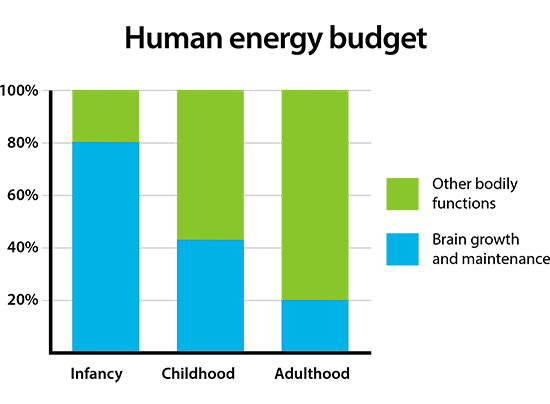show/hide words to know
Energy budget: the amount of energy coming in to a body versus the amount being used.
Growth spurt: a sudden increase in body growth.
Inverse relationship: when an increase in one value causes a decrease in another value.
The brain is expensive
Imagine that you have a pet that is really big and eats a lot of food every day. This pet would be expensive to keep because, even when it's young, it would need a lot of food to grow. As an adult, it might eat even more just to maintain its large body. Brain tissue is expensive to maintain in all mammals. This is especially true for humans because of how large our brains are. As adults, our brains use about 20 percentage of our total energy budget, which is more than any other organ. The only thing more expensive than maintaining a brain is growing a brain.
Early in life, brain growth consumes over 80 percent of our energy. This energetic demand slowly decreases to about 43 percent during childhood. Brain growth continues to be the most expensive part of growth until adult brain size is reached. The energy used for brain growth and body growth is inversely related. This means that as the energy used for brain growth decreases, the energy used for body growth increases. As our brain continues to require less of our energy during growth, the rest of the body can use more energy to fuel its growth. In fact, once the human brain stops growing in size, around the age of 12, humans experience a growth spurt. You may have experienced this yourself or noticed that a friend came back from summer vacation looking a lot taller. A growth spurt occurs when the body grows at a much faster rate than usual. Growth spurts have been documented in a few other primates but only those with large brains. This supports the idea that growth spurts are a product of the energetic demands of large brains.
In fact, once the human brain stops growing in size, around the age of 12, humans experience a growth spurt. You may have experienced this yourself or noticed that a friend came back from summer vacation looking a lot taller. A growth spurt occurs when the body grows at a much faster rate than usual. Growth spurts have been documented in a few other primates but only those with large brains. This supports the idea that growth spurts are a product of the energetic demands of large brains.
What can rocks and sediments tell us about how our ancient ancestors developed over the last 4 million years?
Answer »









